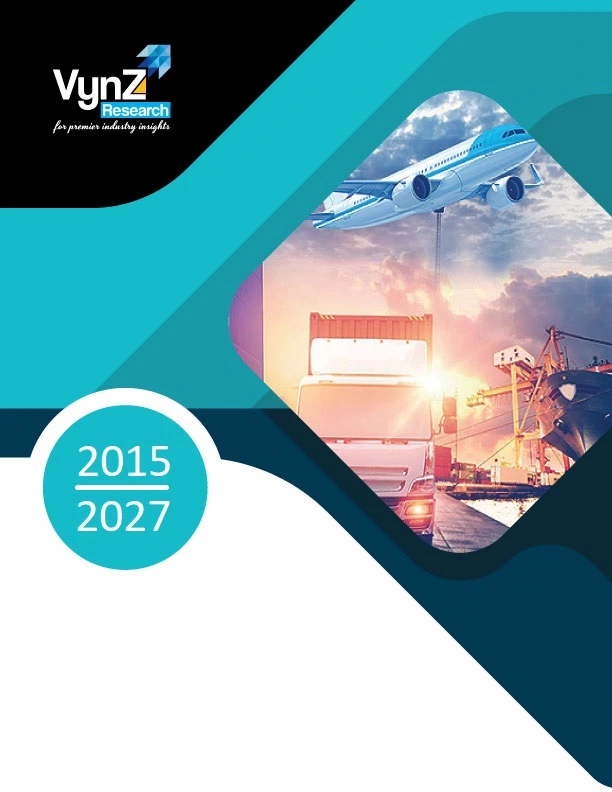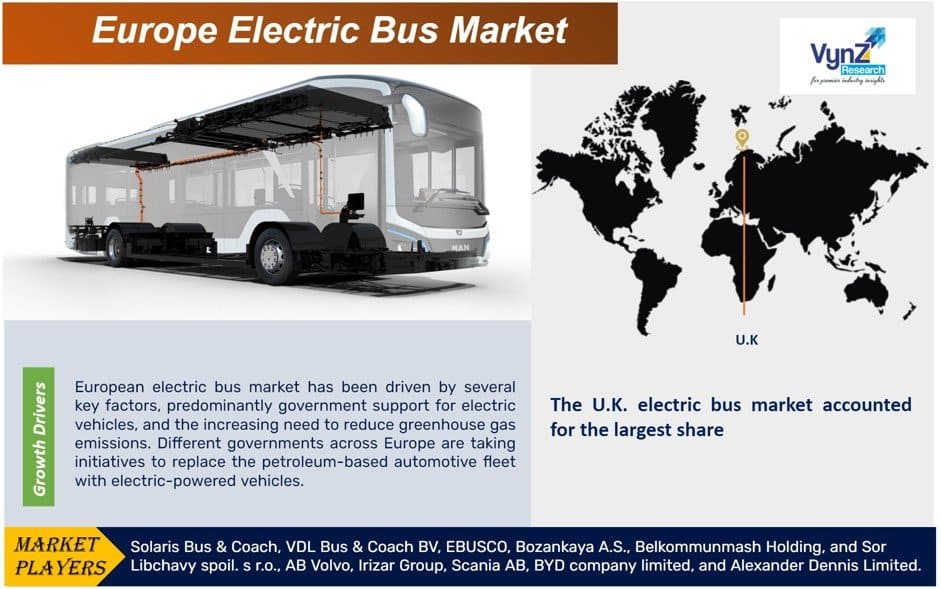| Status : Published | Published On : Nov, 2024 | Report Code : VRAT4062 | Industry : Automotive & Transportation | Available Format :

|
Page : 87 |

Europe Electric Bus Market Size & Share | Growth Forecast Report 2030
Industry Insights by Vehicle Type (Battery Electric Bus [BEB], Hybrid Electric Bus [HEB], Plug-In Hybrid Electric Bus [PHEB]), by Battery (Lithium Iron Phosphate Battery [LFP], Lithium Nickel Manganese Cobalt Oxide [NMC], Others), by Length (Less Than 10m, More Than 10m) and by Geography (U.K., Germany, France,Spain, Netherlands, Sweden, Austria, Poland, Belgium, Rest of Europe)
Industry Overview
The Europe Electric Bus Market is projected to reach 12,866 units by 2030, registering a CAGR of 33.9% during the forecast period.

Government support for electric vehicles, the increasing need to reduce greenhouse gas emissions, and advancements in technology, propelling the growth of the market.
Europe Electric Bus Market Report Coverage
|
Report Metric |
Details |
|
Historical Period |
2018 - 2023 |
|
Base Year Considered |
2024 |
|
Forecast Period |
2025 - 2030 |
|
Market Size in 2024 |
U.S.D. xx Units |
|
Revenue Forecast in 2030 |
U.S.D. xx Units |
|
Growth Rate |
33.9% |
|
Segments Covered in the Report |
By Vehicle Type, By Battery, By Length |
|
Report Scope |
Market Trends, Drivers, and Restraints; Revenue Estimation and Forecast; Segmentation Analysis; Impact of COVID-19; Companies’ Strategic Developments; Market Share Analysis of Key Players; Company Profiling |
|
Regions Covered in the Report |
U.K., Germany, France, Spain, Netherlands, Sweden, Austria, Poland, Belgium, Rest of Europe |
Europe Electric Bus Industry Dynamics
Europe Electric Bus Market Trends/ Growth Drivers
Government support for electric vehicles, and the increasing need to reduce greenhouse gas emissions are the factors responsible for the market growth of European electric bus market. The European Green Deal includes ambitious targets for decarbonizing public transport. The EU has also introduced various regulations such as the Clean Vehicle Directive. Different countries provide incentives and frame regulations to support electric vehicle adoption. In the European Union, governments are undertaking key initiatives to opt for green energy-driven vehicles. The policies related to electric buses in the EU are mainly focused on technological optimization and market development.
Technological advancements in battery capacity, charging infrastructure development, cost competitiveness and total cost of ownership (TCO), lower operational costs, government incentives and subsidies, environmental sustainability and public pressure contribute to the growth of the market. Cities like London, Paris, and Berlin are increasingly concerned with urban air quality, and electric buses help reduce harmful air pollutants like nitrogen oxides.
Europe Electric Bus Market Challenges
Key factors hindering the growth of the European electric bus market are the high price of electric buses and the growing popularity of natural gas-fueled buses.
Recent Developments by Key Players
Solaris Bus & Coach collaborated with REVG Kerpen, a public transport operator based in Kerpen, Germany. The manufacturer has already delivered the first two units to Kerpen, marking the debut of Solaris buses in the city.
Europe Electric Bus Market Segmentation
VynZ Research provides an analysis of the key trends in each segment of the Europe Electric Bus Market report, along with forecasts at the regional and country levels from 2025-2030. Our report has categorized the market based on product, battery type, battery technology and voltage.
Insight by Vehicle Type
- Battery Electric Bus (BEB)
- Hybrid Electric Bus (HEB)
- Plug-in Hybrid Electric Bus (PHEB)
Based on vehicle type, the European electric bus market is categorized into battery electric bus (BEB), hybrid electric bus (HEB), and plug-in hybrid electric bus (PHEB), wherein the BEB category accounted for the largest share in 2020. The category is expected to lead throughout the forecast period, owing to the low or zero emission of greenhouse gases, declining battery prices, and improving battery efficiency. The demand for hybrid electric buses is declining as the demand has majorly shifted towards battery electric buses.
Insight by Battery
- Lithium Iron Phosphate Batteries (LFP)
- Lithium Nickel Manganese Cobalt Oxide (NMC)
- Others
Based on battery, the European electric bus market is divided into lithium iron phosphate batteries (LFP), lithium nickel manganese cobalt oxide (NMC), and others. Among these categories, the LFP category accounted for the largest share during the forecast period. This is primarily due to the increasing traction for the lithium nickel manganese cobalt oxide batteries.
Europe Electric Bus Market: Geographic Overview
- Germany
- U.K.
- France
- Italy
- Spain
- Russia
- Rest of Europe
Geographically, the U.K. electric bus market accounted for the largest share. This is attributed to the increasing adoption rate of electric vehicles, government support schemes for the adoption of electric vehicles, and for development of infrastructure related to electric vehicles including charging stations.
Europe Electric Bus Market: Competitive Insight
- Solaris Bus & Coach
- VDL Bus & Coach BV
- EBUSCO
- Bozankaya A.S.
- Belkommunmash Holding
- Sor Libchavy spol. s r.o.
- AB Volvo
- Irizar Group
- Scania AB
- BYD company limited
- Alexander Dennis Limited
Solaris Bus & Coach sp. z o.o. is one of the leading European bus and trolleybus manufacturers. Solaris affects the quality of city transport in hundreds of cities across Europe every day.
VDL Bus & Coach is a Dutch vehicle manufacturer. It is an amalgamation of several bus building companies within the VDL Group. VDL Bus & Coach has manufacturing plants in Belgium and the Netherlands.
The European Electric Bus Market report offers a comprehensive market segmentation analysis along with an estimation for the forecast period 2025–2030.
.png)
Source: VynZ Research
.png)
Source: VynZ Research
Frequently Asked Questions
Purchase Options
Latest Report
Research Methodology
- Desk Research / Pilot Interviews
- Build Market Size Model
- Research and Analysis
- Final Deliverabvle
Connect With Our Sales Team
- Toll-Free: 1 888 253 3960
- Phone: +91 9960 288 381
- Email: enquiry@vynzresearch.com
Europe Electric Bus Market
